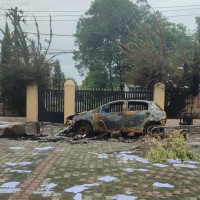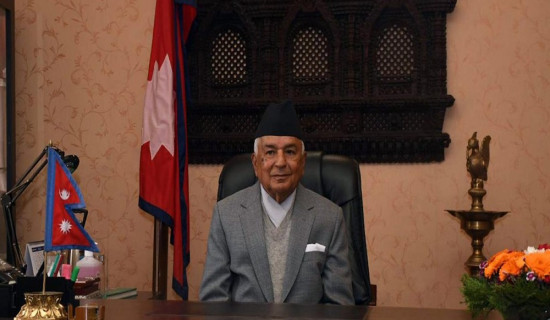- Sunday, 14 September 2025
Healing Nations Begins With Healing Minds
Human history has witnessed numerous political upheavals, including political revolutions, unexpected regime changes, violent conflicts, and protracted political instability. Such upheavals always reshape society, redraw national boundaries, and sometimes redefine national identities. Nepal has undergone several upheavals in the last century. It not only causes unexpected transformation but also takes a toll on mental health and well-being. The history always remembers and celebrates victories, leaders, but the unseen scars it caused to ordinary citizens remain silent. Let us talk about the relationship between political upheavals and mental health, focusing on causes, consequences, and their management.
Our daily life is greatly disrupted by political upheavals. We are forced to live under the shadow of uncertainties as offices close, businesses and activities halt, and schools close. The consequences are not only physical insecurity but also psychosocial strain. When a nation is under such unrest, individual starts feeling helplessness owing to the inability to control or predict what happens next. Those outcomes may be safety, income, or freedom of speech or movement. The psychological trauma due to the feeling of powerlessness takes an emotional toll. For countless families, such upheavals result in displacement, loss of job or livelihood, broken trust, and ultimately, social bonds are shattered.
PTSD
At first, political upheavals increase stress. Fear follows unruly protests, curfew, or violent clashes. The sound of gunfire or the spread of tittle-tattles triggers chronic anxiety. In such a situation, children suffer most, which later manifests as behaviour problems, sleep disturbances, and poor performance in schools. Adults suffer differently as they have to provide security to their near ones. It has been reported that they later suffer mental ailments such as anxiety disorders, post-traumatic stress disorders (PTSD), and sometimes depression. It has been shown that people in conflict-ridden places in Asia and Africa experience a significant increase in the prevalence of PTSD and depression among people of all ages.
Social and political upheavals not only impact individuals but also communities in totality. Often termed as “collective trauma,” it results when an entire community experiences the same wound, such as forced migration, state oppression, or civil war. The collective trauma, unlike individual one, restructures cultural identity, social consortium, and relationships between generations.
When societies come out of totalitarian regimes, people struggle to adopt newly acquired freedom. People grown up in such a situation for a long time remain suspicious of newly established democratic institutions. This newly developed mistrust seeps into familial dynamics when parents teach children how to remain safe, hence perpetuating fears. This develops a vicious cycle of painful silence and anxiety, which may last decades.
Political upheavals also take their toll on the economy, as people not only lose their employment but also have to contend with the dire shortage of daily essentials. It has been proven that poverty leads to poor mental health and well-being, resulting in poor emotional resilience. The political crisis leads to a collapse in health services owing to restrictions in the movement of healthcare staff, interruption in the supply chain, and, not to mention, rarely available counselling services in resource-constrained settings.
The forced displacement in the wake of political upheavals has severe consequences. The prolonged confinement results in loneliness that can be psychologically devastating. Hence, the longer the political instability, the more severe the psychological consequences. Children raised in such instability often carry the pain their parents suffered and which hampers their growth and development. Without appropriate psychosocial counselling, trauma transfers to the upcoming generation.
Political upheaval also affects young adults. The recent political turmoil exposed the youth to violence in Nepal. This exposure may have long-term psychological consequences and hampers social cohesion. Many young people radicalised themselves and were drawn into arson and violent clashes. This might lead to disruption in societal bonding and stability.
Oftentimes, mental health is a neglected issue post political unrest. In many countries and cultures, people suffering from psychological consequences are stigmatised. After political upheavals, reconstruction gets priority over psychological support to the affected. Restoring governance and humanitarian aid has become a common phenomenon. However, reconstruction and economic aid cannot bring stability unless people are psychologically secure.
First, it should be acknowledged that there is a link between political upheaval and mental health. All stakeholders must integrate psychological support into emergency responses. Therefore, mental health initiatives such as community-based counselling, mobile clinics, and tele-mental health activities should be initiated. Trust and solidarity should be built within communities. Community dialogues and cultural events help societies heal collective trauma. Similarly, educational, technical, and vocational training for youth can prevent despair and radicalisation. Thus, a mental health course in schools’ curricula equips young people with tools for resilience.
Resilience
It is important to reduce financial stress through social protection programmes, such as food subsidies or employment schemes, which indirectly support mental health. Public awareness campaigns about mental health can counter silence and stigma, creating a supportive environment for healing. It has been seen throughout the world that communities have shown extraordinary capacity to adapt, rebuild, and recover. It should not be romanticised that resilience is a substitute for structural support. It is unjust to expect people to “bounce back” without providing psychological support.
Political upheavals may alter the course of nations, but their invisible psychological costs ripple across generations. Stress, trauma, displacement, and loss of trust are wounds that cannot be mended by political settlements alone. Thus, acknowledging the mental health dimensions of upheaval is not just an act of compassion but a strategic necessity. The scars of upheaval can hinder reconciliation, development, and democracy if ignored. No matter what system we adopt, political upheaval continues in future, but we must acknowledge that healing nations begins with healing minds.
(Dr. Lohani is the clinical director at the Nepal Poison Information Centre. lohanis@gmail.com)















